Key takeaways:
- View rejections as opportunities for growth, focusing on constructive feedback to improve writing.
- Understand the emotional impact of rejections; celebrate small victories to maintain motivation.
- Tailor query letters and research agents thoroughly to enhance the likelihood of a positive response.
- Build genuine relationships with agents, recognizing that successful representation involves trust and understanding.
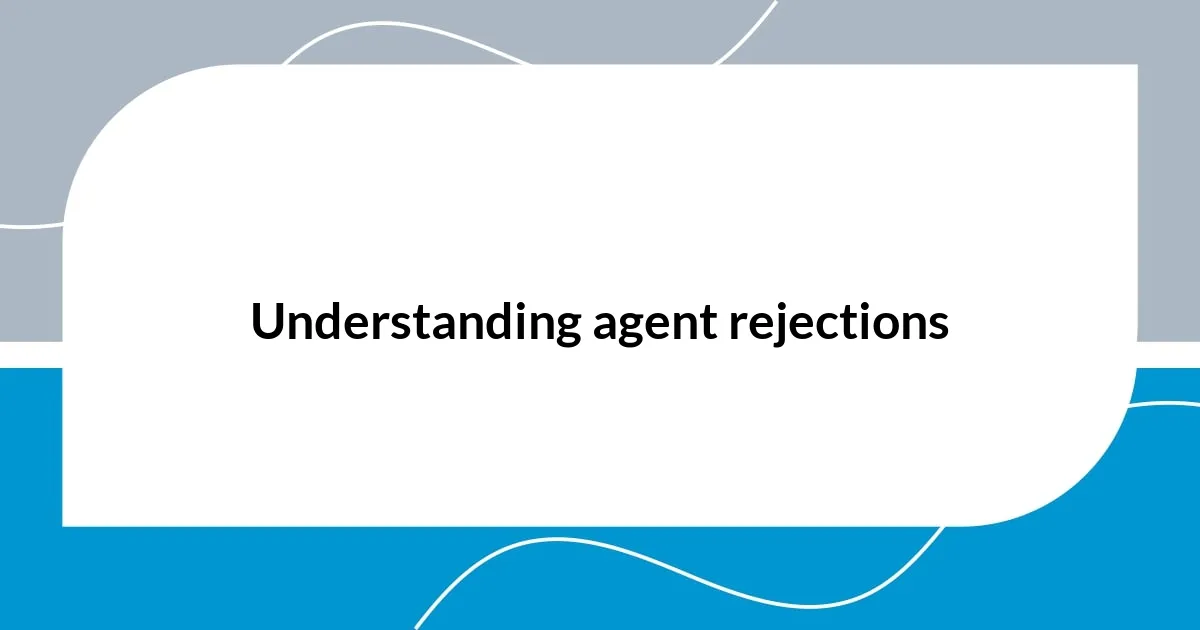
Understanding agent rejections
Agent rejections can feel like a punch to the gut. I remember my first major rejection; my heart sank as I read the email. It was just a few short sentences, but those words carried so much weight. Have you ever felt that way too? It’s a universal experience that every writer grapples with, yet it can be isolating when it happens to you.
Understanding why agents say no often requires a bit of introspection. Instead of taking rejections personally, I’ve learned to view them as stepping stones. For instance, I once received feedback that my opening chapter was intriguing but ultimately too slow. At first, I was disheartened, but that specific insight helped me refine my pacing and ultimately improve my craft. Could these rejections be offering us the guidance we didn’t know we needed?
Moreover, rejections can stem from various factors beyond just the quality of writing. Sometimes, it’s a matter of timing or market trends that are out of our control. I once had a manuscript that was praised by a few agents but ultimately rejected because it didn’t fit their current catalog. As challenging as it was, recognizing that agents are also navigating their own preferences and limitations shifted my perspective. It opened my eyes to the fact that rejection is often part of a much larger picture.
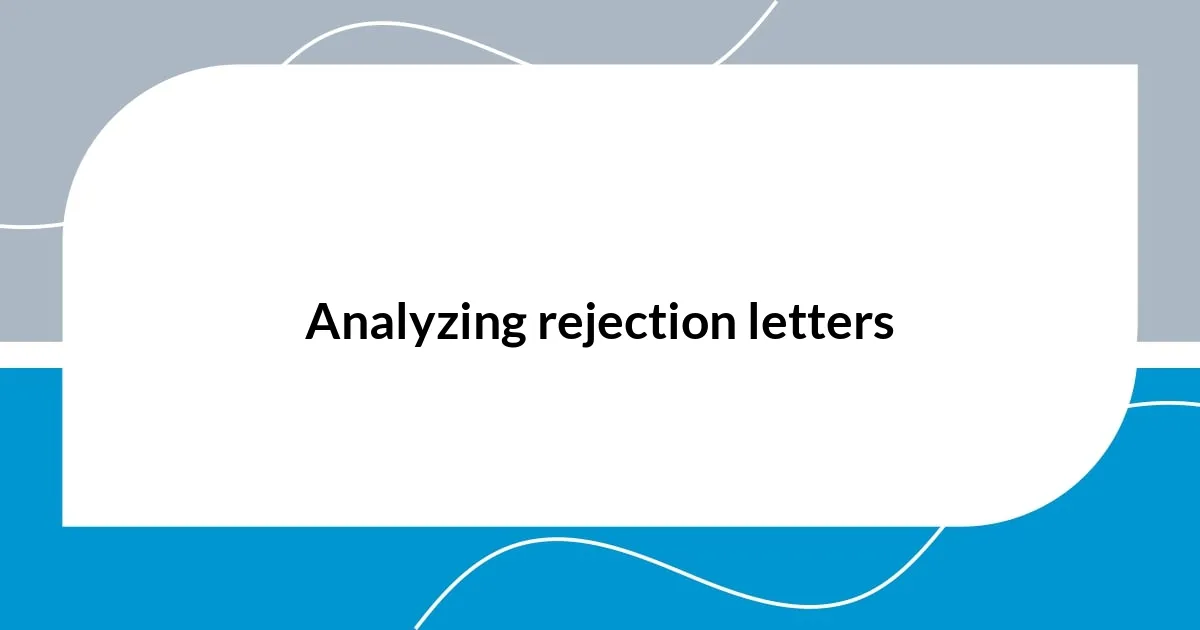
Analyzing rejection letters
Analyzing rejection letters can be a valuable exercise if approached correctly. From my experience, the tone and language of a rejection can vary significantly; one agent might offer a personalized note, while another sends a standard template. I recall receiving a rejection that included a specific compliment about my character development. That touch really lifted my spirits, reminding me that my writing resonated with someone, even if the project wasn’t a fit for them.
It’s also important to dissect the feedback provided, if any. I’ve had rejections that included constructive remarks, like the pacing of my plot. Initially, I merely noted them as critiques, but upon reflection, I began to see them as constructive criticism, a way to better my writing. The next time I received a rejection, I didn’t only focus on the ‘no’; I also scrutinized the wording for any insights I could extract that would enrich my future efforts.
Not all rejection letters are equal, and understanding this can help shield our emotions. A form letter, devoid of any personal touch, can feel impersonal, while a thoughtfully written note can provide a sense of connection, even in rejection. I once received a rejection that encouraged me to submit again after revisions, which felt like a small victory. This variation in rejections reveals much about the agent’s perspective and can guide us in our writing journeys.
| Rejection Type | Typical Characteristics |
|---|---|
| Personalized Note | Specific feedback, warm tone |
| Standard Template | Generic response, no personalization |
| Constructive Critique | Actionable tips, potential areas for improvement |
| Encouraging Note | Invitation to resubmit after revisions, supportive language |
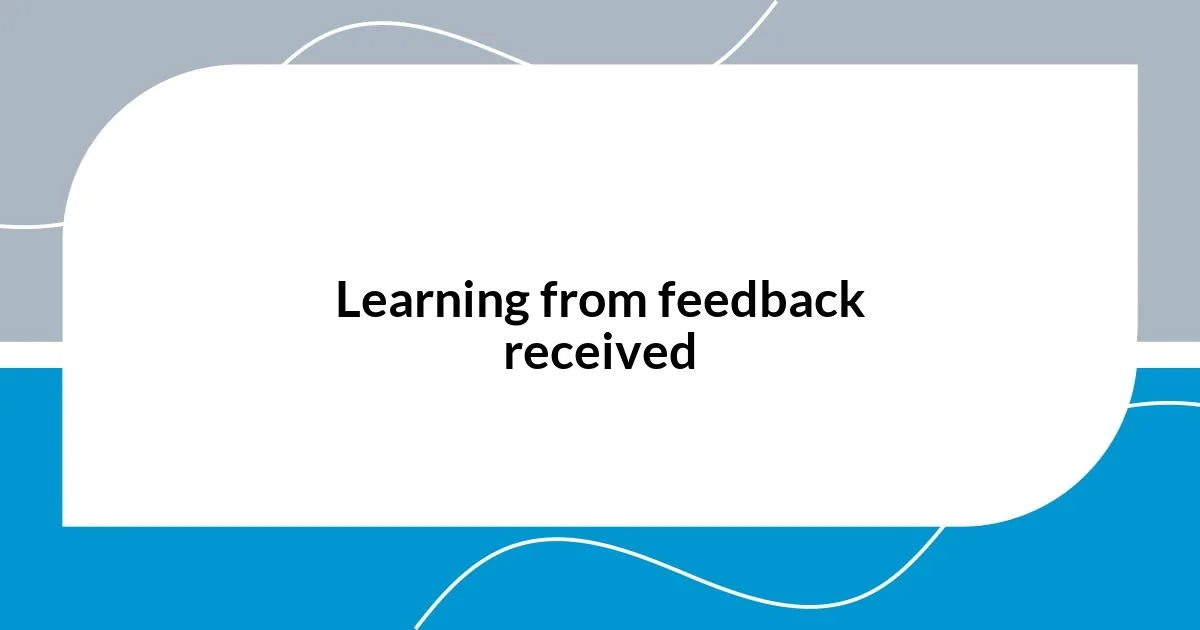
Learning from feedback received
Receiving feedback through rejections can feel like a double-edged sword. I remember one rejection where the agent took the time to point out how much they loved my main character’s voice, which was unexpected. It left me feeling both validated and disheartened, as I grasped that my character had potential, yet the story did not resonate fully. This experience taught me to sift through the details—there’s often a gem hidden in the critiques that can spark new ideas.
When reflecting on the feedback I’ve received, I’ve found it helpful to jot down key insights that stand out. Here’s a list of takeaways I’ve learned from analyzing rejection feedback:
- Identify consistent themes in critiques; if multiple agents mention pacing or character depth, it’s time to address those areas.
- Separate personal feelings from the feedback; acknowledge emotions but focus on constructive elements that can refine your work.
- Seek clarity on vague feedback; don’t hesitate to reach out for specifics if permitted, as it can clarify what agents really want.
- Celebrate positive comments; use them as a confidence boost during the challenging writing process.
- Keep an open mind; every rejection is an opportunity to enhance your craft and could bring you closer to your goal.
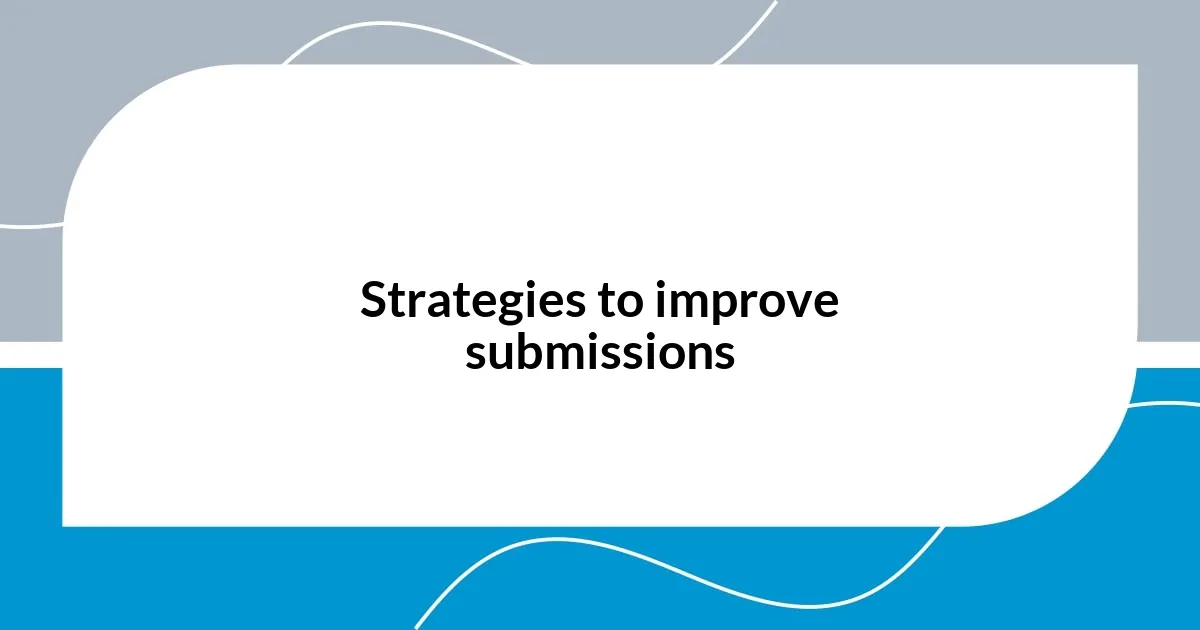
Strategies to improve submissions
When it comes to improving submissions, I’ve found that tailoring my query letters significantly impacts agents’ responses. I once spent extra time aligning my letter to match the agent’s preferences outlined on their website; this small change led to a surprising number of personalized replies. Have you considered how a few tweaks to your approach could yield different results?
Another strategy that has worked wonders for me is developing a clear and captivating hook for my project. I remember crafting a one-sentence pitch that sparked interest and curiosity. This concise summary not only helps agents quickly see the potential in my work but also clarifies my own vision for the story. It’s amazing how a well-articulated hook can elevate your submission above others.
Lastly, I recommend joining a critique group or workshop. Sharing my work with a trusted community has helped me see blind spots in my writing I might otherwise overlook. When I received feedback that my opening chapters were too slow, I took it to heart and revised extensively. The camaraderie and insight from fellow writers have truly invigorated my submissions—you might find the same sense of support invaluable in your journey.
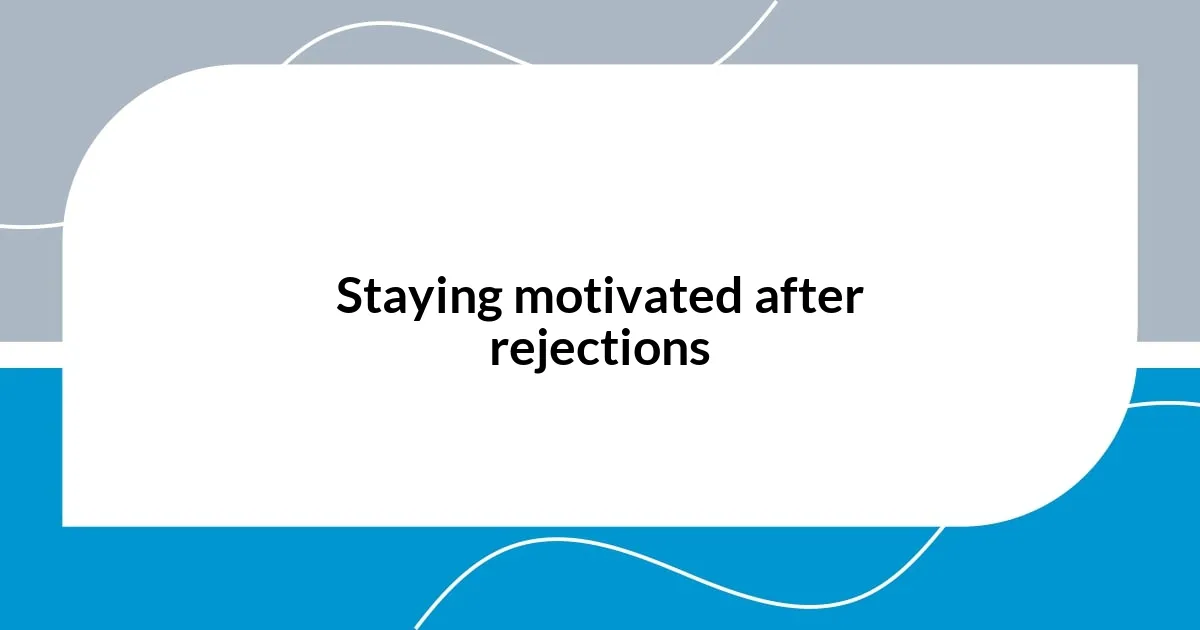
Staying motivated after rejections
Staying motivated after facing rejection can be a tough battle. I remember feeling utterly deflated after receiving yet another “not right for me” response. It was one of those moments when I had to remind myself that each rejection isn’t a reflection of my potential, but rather a step in the journey. Have you ever felt that sense of despair creeping in? I know I have, and it’s vital to acknowledge those feelings but not to dwell on them.
I’ve found that setting small, achievable goals can really help maintain the momentum. After a few rejections piled up, I decided to challenge myself to write a new short story each week. This not only helped me stay productive but also injected some much-needed creativity into my routine. Focusing on these mini-accomplishments shifts my attention away from the setbacks and back onto the joy of writing itself. Have you ever tried turning the disappointment into a source of inspiration?
Celebrating small victories is another way to keep motivation flowing. Even something as simple as finishing a chapter or receiving positive feedback from a friend can be a reason to take a moment to acknowledge your progress. I like to treat myself to a favorite snack or take a walk amidst nature whenever I finish a piece. This ritual reminds me that the journey is about growth, and even when the path gets rocky, there’s always something worth celebrating along the way. How do you celebrate your own wins, no matter how small?
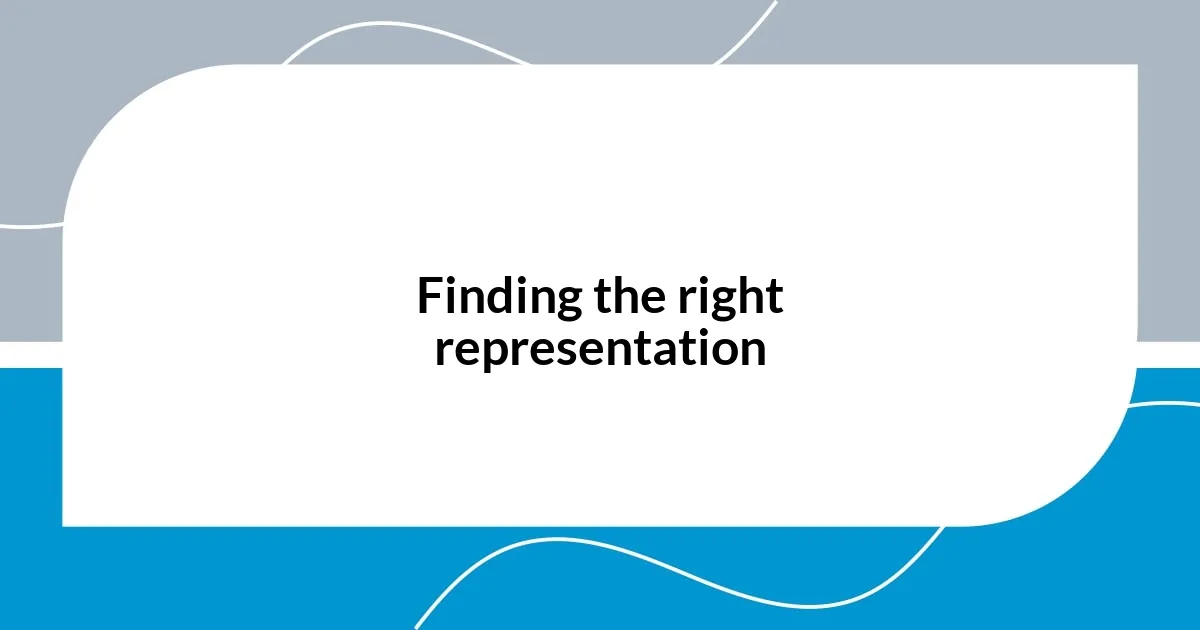
Finding the right representation
Finding the right representation can feel like searching for a needle in a haystack. I vividly recall the day I tailored my query letter to suit not just the agent’s preferences, but also my own vision. I had been sending out generic pitches without realizing the power of authenticity, and when I finally embraced my unique voice, everything shifted. Have you ever thought about how being truly yourself might resonate better than fitting into a mold?
It’s also essential to research agents thoroughly before submitting. There was an agent I admired for years, but I was surprised to discover that her taste didn’t align with my genre after diving into her portfolio. It taught me a valuable lesson about compatibility—representation isn’t just about getting someone interested; it’s about finding someone who genuinely connects with your story. How often do we overlook this crucial aspect in our excitement to get a foot in the door?
Lastly, I believe in building genuine relationships with agents. I once attended a literary conference where I had the chance to speak with an agent I had been eyeing. Instead of a formal pitch, I shared my journey as a writer and connected over mutual interests. That conversation was incredibly enlightening and made me realize that representation is more than a transactional relationship; it’s about trust and understanding. Have you considered how a simple conversation could shape your path ahead?